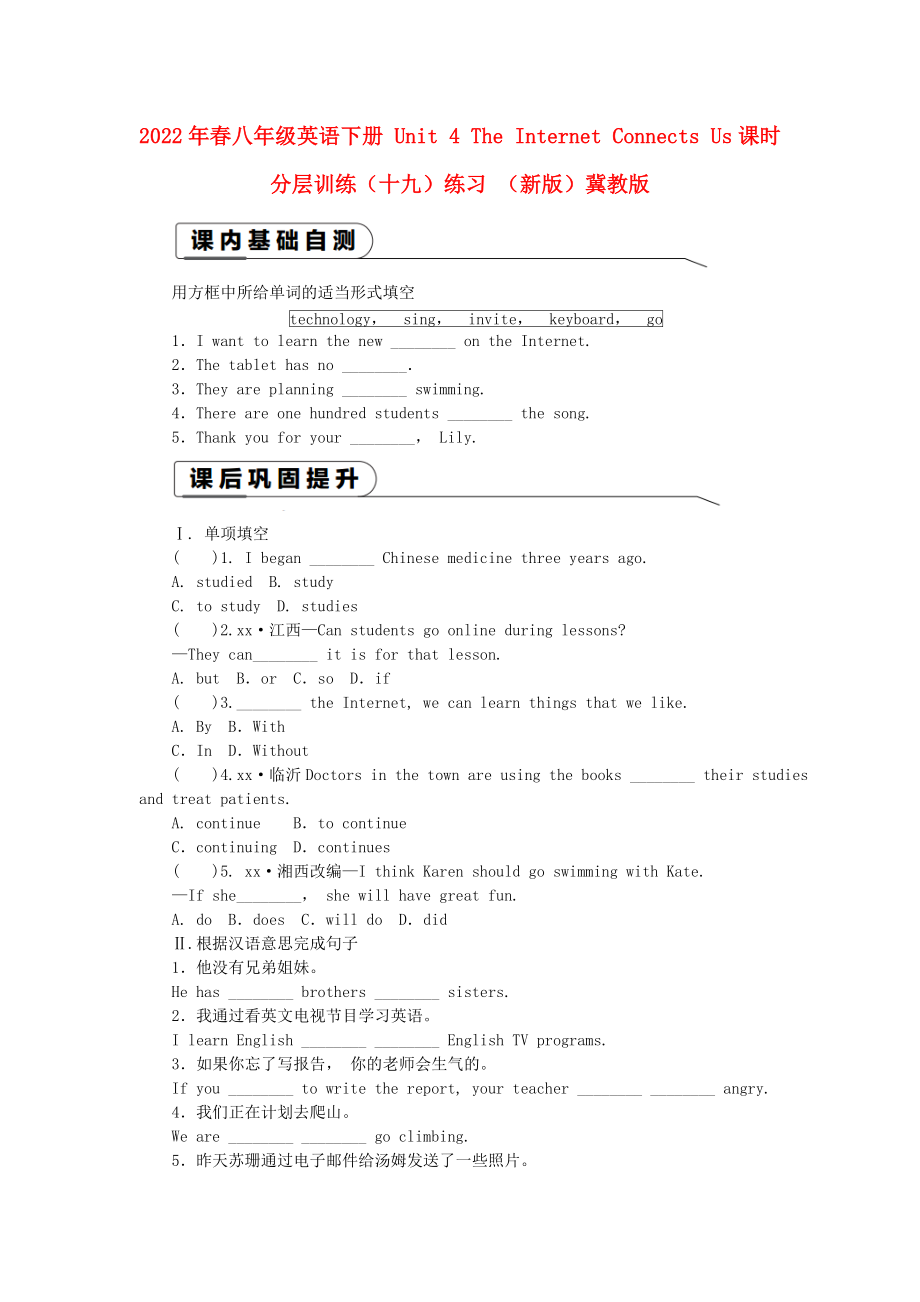《2022年春八年級(jí)英語(yǔ)下冊(cè) Unit 4 The Internet Connects Us課時(shí)分層訓(xùn)練(十九)練習(xí) (新版)冀教版》由會(huì)員分享��,可在線閱讀�����,更多相關(guān)《2022年春八年級(jí)英語(yǔ)下冊(cè) Unit 4 The Internet Connects Us課時(shí)分層訓(xùn)練(十九)練習(xí) (新版)冀教版(3頁(yè)珍藏版)》請(qǐng)?jiān)谘b配圖網(wǎng)上搜索��。
1����、2022年春八年級(jí)英語(yǔ)下冊(cè) Unit 4 The Internet Connects Us課時(shí)分層訓(xùn)練(十九)練習(xí) (新版)冀教版
用方框中所給單詞的適當(dāng)形式填空
1.I want to learn the new ________ on the Internet.
2.The tablet has no ________.
3.They are planning ________ swimming.
4.There are one hundred students ________ the song.
5.Thank you for your ________�, Lily
2、.
Ⅰ. 單項(xiàng)填空
( )1. I began ________ Chinese medicine three years ago.
A. studied B. study
C. to study D. studies
( )2.xx·江西—Can students go online during lessons?
—They can________ it is for that lesson.
A. but B.or C.so D.if
( )3.________ the Internet, we can learn things that we lik
3���、e.
A. By B.With
C.In D.Without
( )4.xx·臨沂Doctors in the town are using the books ________ their studies and treat patients.
A. continue B.to continue
C.continuing D.continues
( )5. xx·湘西改編—I think Karen should go swimming with Kate.
—If she________���, she will have great fun.
A. do B
4、.does C.will do D.did
Ⅱ.根據(jù)漢語(yǔ)意思完成句子
1.他沒(méi)有兄弟姐妹�。
He has ________ brothers ________ sisters.
2.我通過(guò)看英文電視節(jié)目學(xué)習(xí)英語(yǔ)。
I learn English ________ ________ English TV programs.
3.如果你忘了寫(xiě)報(bào)告���, 你的老師會(huì)生氣的�。
If you ________ to write the report, your teacher ________ ________ angry.
4.我們正在計(jì)劃去爬山��。
We are ________ _
5、_______ go climbing.
5.昨天蘇珊通過(guò)電子郵件給湯姆發(fā)送了一些照片�。
Susan ________ some pictures ________ Tom ________ e-mail yesterday.
Ⅲ.閱讀理解
What can you do on the Internet? Many of us like to read news, buy things and play games. Some students now have a new use for the Internet—helping them with their homework.
6�、Tina, 14, from Shenzhen, Guangdong, often searches online for the answers to her maths problems. She said sometimes she and her parents don't know the answers to the problems, so she has to turn to the Internet.
“I can see how other people work out these problems and learn from them,” Tina said. “I
7��、t's easy and saves time.”
But not all the students wele this. Leo, 15, from Hangzhou, Zhejiang, thinks it may make students stop thinking.
“We should think over the problems first. Simply copying the answers won't improve our abilities��,” he said.
In the eyes of Wang Zhaoming, a teacher in Shangha
8�����、i, the success of all this is down to the students. “If they use the Internet properly(適當(dāng)?shù)?, it could be a good tool for study���,” Wang said.
“Students should first think about the problems by themselves. As for the online answers, they should choose the best among different ones. The most important
9��、thing is to know the logic(邏輯) behind the answers�����,” he said. “Don't be shy to ask teachers and classmates the next day if you don't understand the answers.”
( )1. According to the passage, it's a new use for students to ________ on the Internet.
A. buy things
B.play games
C.help with their ho
10�����、mework
D.read news
( )2. In Leo's opinion, searching online for the answers may ________.
A. make students simply copy the answers instead of thinking
B.help solve the problems
C.be a good tool for study if students use the Internet properly
D.improve the students' abilities
( )3. The bes
11��、t title of this passage is________.
A. How to use the Internet to do homework properly
B.How to shop online
C.Is the Internet bad or good for students
D.puters or teachers
詳解詳析
課內(nèi)基礎(chǔ)自測(cè)
1.technology 2.keyboard 3.to go
4.singing 5.invitation
課后鞏固提升
Ⅰ.1.C begin to do sth. 意為“開(kāi)始做某事”�。
12、2.D 3.B
4.B use sth. to do sth. 意為“用某物做某事”�����。故選B����。
5.B
Ⅱ.1.no; or 2.by watching
3.forget; will be 4.planning to
5.sent; to; by
Ⅲ.[主旨大意] 這篇短文主要介紹了孩子們應(yīng)該如何利用互聯(lián)網(wǎng)來(lái)幫助自己寫(xiě)作業(yè),并對(duì)此提出了具體建議��。
1.C 細(xì)節(jié)理解題��。根據(jù)第一段中“Some students now have a new use for the Internet—helping them with their homework.”可知�,用互聯(lián)網(wǎng)幫助學(xué)生們做作業(yè)是學(xué)生用互聯(lián)網(wǎng)的一個(gè)新用途,故選C����。
2.A
3.A 這篇短文主要介紹了孩子們應(yīng)該如何利用互聯(lián)網(wǎng)來(lái)幫助自己寫(xiě)作業(yè),故選A����。
 2022年春八年級(jí)英語(yǔ)下冊(cè) Unit 4 The Internet Connects Us課時(shí)分層訓(xùn)練(十九)練習(xí) (新版)冀教版
2022年春八年級(jí)英語(yǔ)下冊(cè) Unit 4 The Internet Connects Us課時(shí)分層訓(xùn)練(十九)練習(xí) (新版)冀教版

